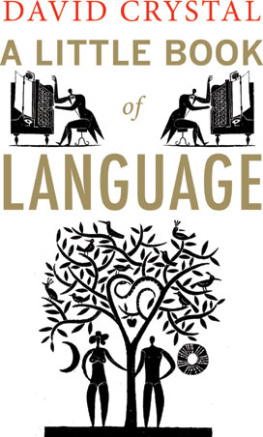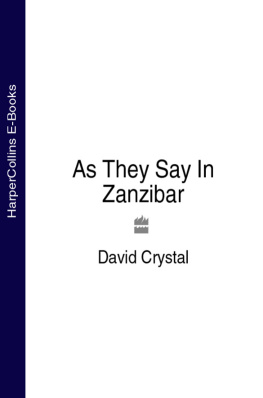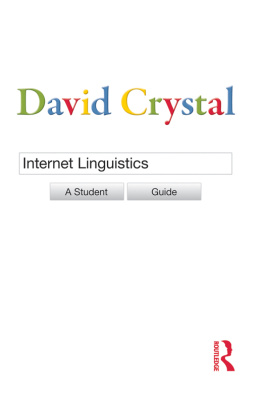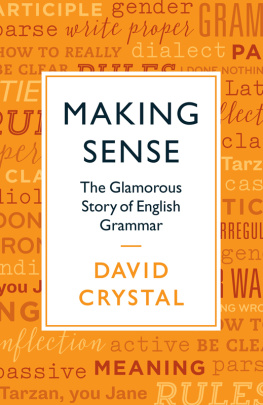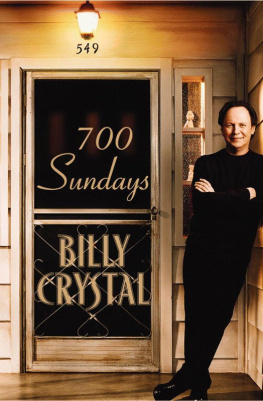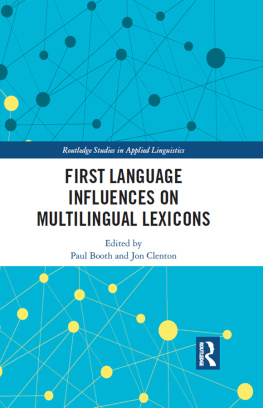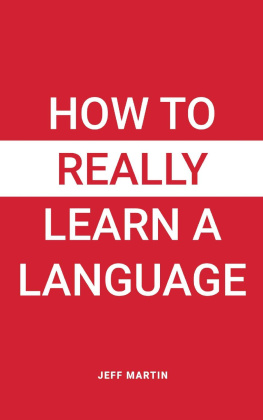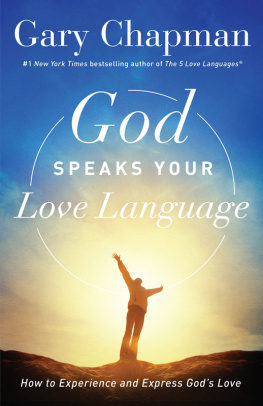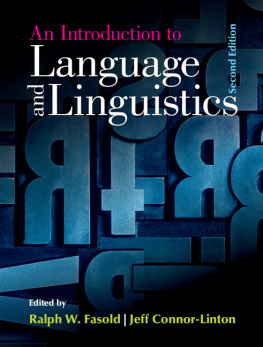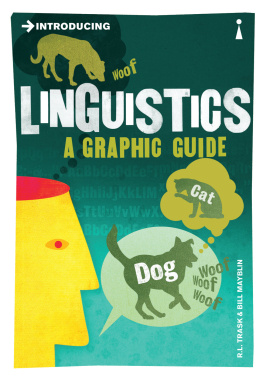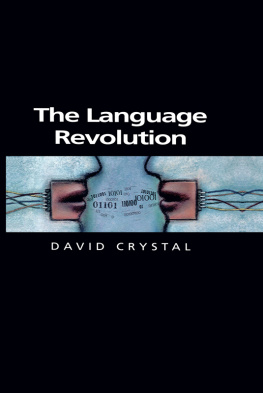A LITTLE BOOK OF LANGUAGE
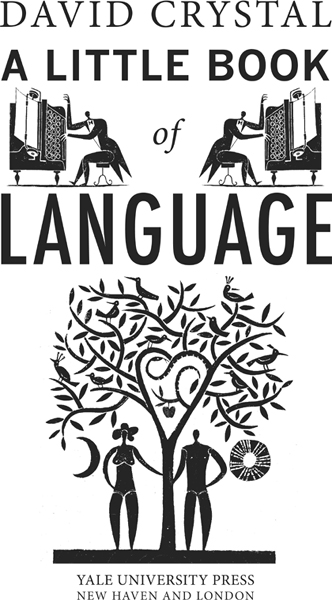
Copyright 2010 by David Crystal
All rights reserved. This book may not be reproduced in whole or in part, in any form (beyond that copying permitted by Sections 107 and 108 of the U.S, Copyright Law and except by reviewers for the public press), without written permission from the publishers.
For information about this and other Yale University Press publications please contact:
U.S. Office: sales.press@yale.edu www.yalebooks.com
Europe Office: sales@yaleup.co.uk yalebooks.co.uk
Set in Minion by Yale University Press
Printed in Great Britain by TJ International Ltd, Padstow, Cornwall
Library of Congress Cataloging-in-Publication Data
Crystal, David, 1941
A little book of language / David Crystal.
p. cm.
Includes bibliographical references and index.
ISBN 978-0-300-15533-4 (alk. paper)
1. Language acquisition. I. Title.
P118.C74 2010
400dc22
2009037998
Acatalogue record for this book is available from the British Library
10 9 8 7 6 5 4 3 2 1
Contents
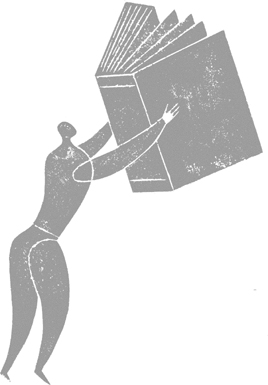
CHAPTER 1
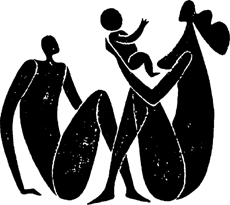
Baby-talk
We sometimes do some silly things with language. One of the silliest happens when we find ourselves in front of a new baby. What do we do?
We talk to it.
We probably say Hello or Whats your name? or Arent you lovely! or something like that.
Why do we do that? The baby certainly hasnt learned any language yet. It cant possibly understand a word of what were saying. And yet we talk to it as if it does.
The babys mother is usually the first to strike up a conversation with it. Heres an actual example, which was audio-recorded just a few minutes after one baby was born:
Oh you are gorgeous, you are gorgeous, you are, you are, you are, oh yes you are hello hello arent you beautiful
And she went on like this for quite a while, while she cuddled the new arrival. The baby, meanwhile, wasnt paying the slightest attention. It had stopped crying and had its eyes shut. It may even have been asleep. But the mother didnt care. She was being totally ignored and yet she kept on talking.
And talking in a very funny way. I cant easily write down the way her voice went, but it was something like this:
Oh
h
h
you
are
gorgeous,
you
are
At the beginning of her sentence, her voice was very high, and she then let it fall all the way down. It was almost as if she was singing. When she said hello her voice went very high again and she stretched the word out helllloh. The arent you beautiful was very high too, as if she was asking a question.
The other thing she did, which we cant see from the way the words are written down, is that she rounded her lips while she spoke puckering them as if she was giving someone a kiss. If we say something it doesnt matter what Arent you a lovely little baby then? but say it with our lips pushed out as far as we can, and listen to how it sounds, it sounds like baby-talk. And thats exactly what people call it.
The lip-rounding is an important feature of baby-talk. So is the exaggerated melody of the voice. And theres another unusual feature of the way the mother was talking to her baby. She said the same thing over and over:
Oh you are gorgeous, you are gorgeous, you are, you are, you are.
Now thats not very normal. When would you ever go up to someone and say the same thing three times in a row? We dont meet a friend in the street and say:
Hi John, hi John, hi John. Coming to the shop? Coming to the shop? Coming to the shop?
We would probably be locked up if we did that. Yet we talk like that to babies and nobody notices anything odd about it at all.
Why did the mother do it? Why do so many of us do it?
Lets think about it from mums point of view first. She so loves that baby, and she wants to tell it so. But theres something else: she wants the baby to tell her back. Unfortunately, baby cant talk yet. But maybe, she thinks, if I can get the baby to just look at me, to see me for the first time if I can just get the babys attention?
Well never get someones attention if we stay quiet or say ordinary things. Instead we shout, or we whistle. We say something different, something noticeable: Hey, Fred! Over here! Yooo-hooo! Think about Yooo-hooo! for a moment. What a strange pair of noises to make! But we hear people make noises like that when they want someone over the road to notice them.
And we make different noises when we want to get the attention of babies. Well never get them to notice us if we say ordinary things in an ordinary way. Ive listened to many recordings of conversations with newborn babies, and nobody ever talks to them like this, in a matter-of-fact tone of voice:
Good morning. I am your mother. This is a hospital. That is a midwife. Here is a bed. Your name is Mary
Thats the sort of language wed use to talk to young children when theyre a bit older. Its more businesslike, more informative. More like a teacher. People talk to two-year-olds like that. Careful. Thats a hot tap. Theres the cold one We dont talk to new-born babies in this way.
Now think about it from the babys point of view. Here you are, just arrived in the world, and all sorts of things are going on. Its not been all that pleasant an experience, being born, and youve been crying a lot. But things are settling down now. Youre warm, and you feel comfortable, and someone is making noises at you nonsense noises, but still Are they worth paying attention to? If youre hearing This is a hospital. That is a midwife. Here is a bed said in an everyday, flat tone, you might well conclude that this new world is going to be deadly boring, and you might as well go back to where you came from. But if you hear Oh you are gorgeous sweeping melodiously from high to low, and repeated several times, well maybe this new world is going to be interesting after all! Maybe I should open my eyes and see ooh, some rather interesting-looking lips! So whos that, then? She looks rather nice!
Baby talk is one of the ways mothers and others develop a strong bond with their babies. And it lays the foundation for the development of language. Without realizing it, by talking to babies in this way we are beginning to teach them their mother tongue or tongues, of course, if the baby is in a family where more than one language is spoken. By repeating the sentences, and making them noticeable, we are kick-starting the process of language learning. When people start to learn a foreign language, they know what they need in order to say their first words. They need to hear them said, over and over, loud and clear, by someone who knows how to do it. Its the same with babies. If they hear the same sounds and words and word patterns repeated, theyll soon pick the language up.
But how soon is soon? How long does it take babies to learn to talk? And which bits of their mother tongue will they learn first?
BABIES, BUDGIES, AND BANGS
We talk baby-talk to babies. But there are two other occasions when we use baby-talk.
One is when we talk to animals. If we listen carefully to someone talking to a pet, what we hear is something very like what happens when we talk to babies. Indeed it can be even more peculiar. And people dont realize theyre doing it. I once recorded my mum talking to her budgie, and then played it back to her afterwards. She couldnt believe she sounded so strange! But the budgie didnt think so.

